The pages of automotive history books are littered with examples of people buying and squirreling away a new car believing it will become a valuable future classic. This strategy sometimes works, but at others, it fails fairly dismally. Such has been the case with the 1978 Corvette Indy Pace Car. It has never reached the dizzying heights many expected, losing money in real terms since it graced showroom floors forty-six years ago. We’ve seen a few exceptional low-mile examples at Barn Finds, but the difference with our feature car is that it is a tidy survivor that has been driven and enjoyed as its creators intended. It runs and drives perfectly, allowing the winning bidder to fly in and drive this classic home.
The seller has listed this Corvette on behalf of his elderly uncle who is an avid collector. He has decided to step away from those activities, meaning this Indy Pace Car must find a new home. The seller believes it is a genuine survivor that wears its original Black and Silver paint. He treated it to a recent buff and polish that produced positive results. The paint holds an excellent shine, with only the typical array of minor chips and marks accumulated through regular use. They replaced the Red stripes that separate the Black and Silver, although some of the remaining decals look original and exhibit checking. The best news hides below the surface, with the seller confirming that this beauty is rust-free. The mirrored glass roof panels look excellent, with the lack of interior water damage suggesting the seals are in good order. The trim looks pretty nice for its age, and the seller states that the alloy wheels and BF Goodrich T/A Radials are new.
The 1978 model year wasn’t the worst in the C3 Corvette’s production history when the subject turned to performance, with 1975 scoring that dubious honor. However, there was no arguing that the 1978 Corvette wasn’t the fire-breathing monster the C3 had been during the early days. This car’s 350ci v8 should produce 185hp and 280 ft/lbs of torque, which feeds to the road via a three-speed automatic transmission. That brings us to an interesting statistic that probably better demonstrates the evolution of the Corvette than any other. Early cars were criticized for the six-cylinder engine and Powerglide, with many welcoming the arrival of a V8 and a manual transmission. Tastes had changed by the time our feature car rolled off the line, with nearly 83% of buyers opting for the self-shifter. The seller indicates that as well as the new wheels and tires, this Pace Car benefits from a new Magnaflow exhaust and brakes. They include a link to this YouTube video in the listing. It provides a comprehensive walkaround and allows us to hear and see the car in action. I am impressed by how cleanly it pulls from low-speed, and how it features none of the squeaks and rattles that often develop with age.
I would describe this Corvette’s interior as tidy and serviceable, but there are a few rough edges the new owner might choose to address to improve its presentation. The most obvious is the damaged carpet on the lower door trims, which seriously detracts from the appearance. The carpet might present better with a deep clean, and some loose wires are hanging below the dash. Otherwise, the distinctive Silver leather seatcovers are in good condition, there is no evidence of cracked or broken plastic, and the only aftermarket addition is a radio/cassette player that I would probably “lose” fairly quickly. The first owner equipped the interior with air conditioning, power windows, and a tilt/telescopic wheel.
Chevrolet produced 6,502 examples of the 1978 Corvette Indy Pace Car Edition with a sticker price of $13,653. That translates to around $65,000 today. Pristine examples struggle to top $35,000 in the current classic market. Therefore, these cars proved to be a dud as a long-term investment. However, if viewed purely as a classic that can be driven and enjoyed, they are typically quite affordable. The seller listed this survivor here on eBay in Shuqualak, Mississippi. Sixteen bids have pushed the price to $13,300, which is below the reserve. Recent sales results suggest it will probably struggle to top $15,000, although, with the classic market so unpredictable at the moment, it might spring a surprise by climbing higher. Do you agree?
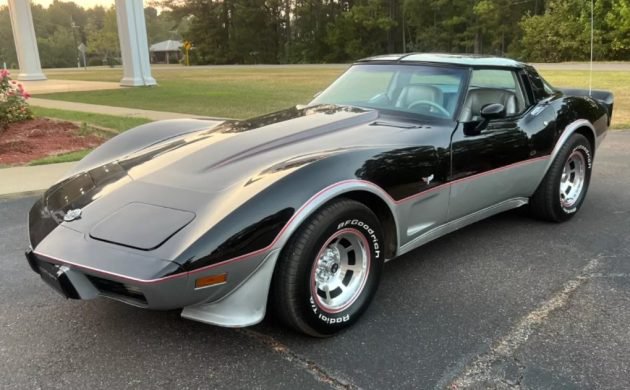
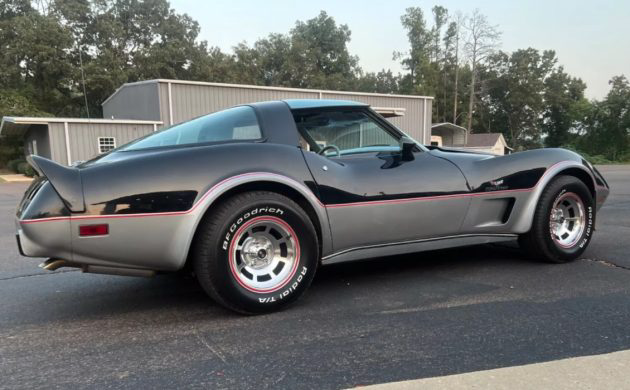
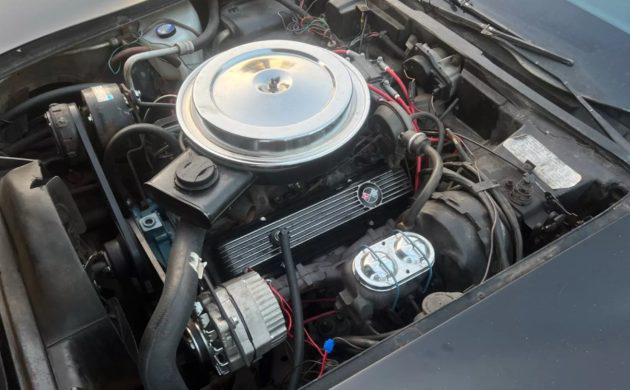
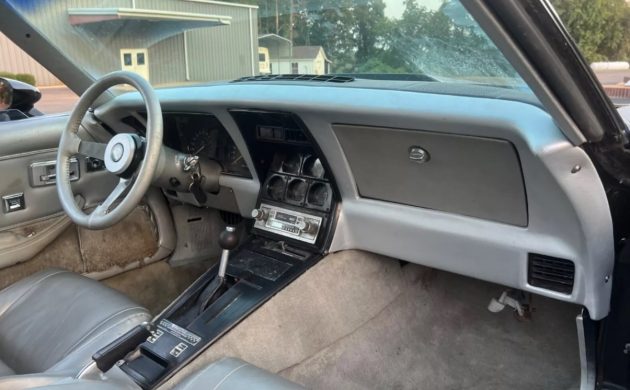
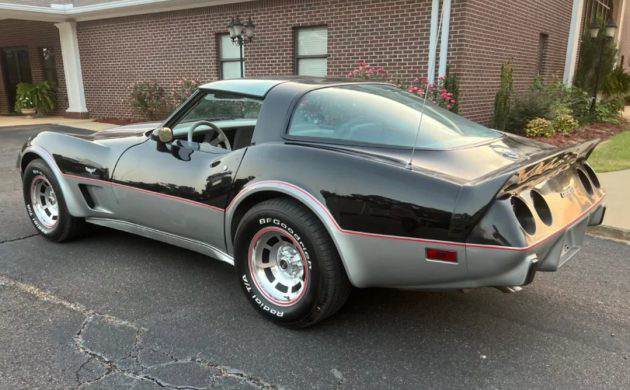





Looks like a nice, get-in-and-go driver. Chevrolet destroyed any chance for blue-chip investment possibilities by giving in to dealer complaints and bumping production to 6502 so each dealer could have one. Even the original plan for 2500 units was too many.
Unlike the 25th anniversary cars, the pace cars were all basically fully equipped. Power windows, air conditioning, and the tilt/telescope steering column were all included. The stereo would have been either an AM/FM/CB or an AM/FM/8-track. Based on the antennal, my guess is that this one had the 8-track.
Odd no cassette player avail in ’78 & odd that vettes did not get the antenna embedded in the windshield – like many other GM cars got back then – including 2nd gen f-bodies.
Looking at the result, maybe the headlights should not have been converted
from vacuum to electric motors?
might be the highest HP option quadrajet 350 making a whopping 220hp over the 175 and 185hp models. that was a sad time in performance vehicles!
The VIN shows the base L-48, but those sure look like L-82, finned aluminum valve covers. No L-82 badges on the hood from what I can see.
Looks way better without the official decal on the side. Stand back people, official car coming through!
I owned one in the late 90s. Had the L48 auto. What a performance disappointment. I got embarrassed by a fox body mustang. Another problem these cars had was the ignition switch. You had to tilt the steering column down while turning the key
so the starter could the car would start. Great looking car. Beautiful stance but didn’t match in performance.
I’m curious about what you were expecting from the L-48, auto? The only way to order a 1978 was L-82, 4-speed, FE-7. Then you remove the AIR pump and cat converter. My 1979 was set up like that and the original owner kept the removed parts. I also found a place that would pass it on inspection for $25. It ran pretty good with the 3.73 gearing.
Ike two things to consider. One I bought the car while living in California and California has very strict rules pertaining to smog. Second I bought it used in 1998 so it was what it was. I don’t know where you live but it’s a federal crime to remove any factory emissions.
Tell that to the young thugs who steal cat converters and the scrap dealers who buy them. And read my post again. You missed the part where I mentioned I had all the parts that were removed by the original owner. I slept easy the entire time I owned that car.
I was selling Chevy’s in ‘78 at a large dealership so we were able to get these without much problem. I recall buyers coming in and paying $25K which was the market price at the time, convinced they’d sell them and be rich in a few years. The L-82 and a 4-speed was the hot ticket and a bit harder to find. Unless you kept it in the wrapper and haven’t driven it at all you’ll struggle to recover your investment after it’s sat around for 46 years.
I was just thinking – if a lot of these were purchased as investments, why wouldn’t you get the top notch L82 / 4 speed?
Hard to find is most likely the answer to that question. People bought what they could get their hands on.
Ike I did re-read your post several times and I found it to be ambiguous what you were trying to say. You said the original owner “kept” the original parts and Then you remove the AIR pump and cat converter. And “I also found a place that would pass it on inspection for $25.” So once again if you or anyone remove smog equipment legally or illegally you are in some deep manure.
Frog- The original owner removed the smog stuff. That is his issue. He saved everything he took off and gave it to me when I bought the car. Glad he did that. The AIR pump setup was $2000 ten years ago, if you could find a complete system. Same with the catalytic converter. I was too lazy and mechanically incompetent to put it all back on. I did put it back in the box and gave it to the purchaser of my 1979. I now throw myself on the mercy of the court, Your Honor. Have mercy on my soul.
Frank I’m not the one to render judgment on you. I’m just relaying my experience forward. California is a strange and different fruit and nut altogether. Later year cars had to have not only a federal emissions tag under the hood but a California emissions tag as well. There is nothing different or added on the vehicle that justifies having it on there and even without it, it passes smog emissions just the same.
Don’t ever get on the bad side of the DMV. They will make your life a living HELL.
Frank I’m not the one to render judgment on you. I’m just relaying my experience forward. California is a strange and different fruit and nut altogether. Later year cars had to have not only a federal emissions tag under the hood but a California emissions tag as well. There is nothing different or added on the vehicle that justifies having it on there and even without it, it passes smog emissions just the same.
Don’t ever get on the bad side of the DMV. They will make your life a living HELL.
Cars with cats may pass smog, but do they pass something else? –>
Just anonymously send the Calif DMV (& CARB) handwritten letters(they wont miss those) reminding them that CO2 global warming was never mentioned before cat converters became common – now there are billions of cats on the road – & what do they produce? Just a coincidence? I say no.